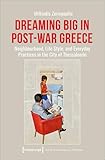Dreaming Big in Post-War Greece : Neighborhood, Life Style, and Everyday Practices in the City of Thessaloniki / Miltiadis Zermpoulis.
Material type: TextSeries: Kultur und soziale PraxisPublisher: Bielefeld : transcript Verlag, [2023]Copyright date: ©2023Description: 1 online resource (302 p.)Content type:
TextSeries: Kultur und soziale PraxisPublisher: Bielefeld : transcript Verlag, [2023]Copyright date: ©2023Description: 1 online resource (302 p.)Content type: - 9783839464915
- Asia Minor
- City
- Consumption
- Cultural Anthropology
- Ethnology
- Materiality
- Middle Class
- Migration
- Post-War Thessaloniki
- Refugees
- Social Inequality
- Society
- Space Production
- Urban Studies
- Westernization
- SOCIAL SCIENCE / Anthropology / Cultural & Social
- Asia Minor
- City
- Consumption
- Cultural Anthropology
- Ethnology
- Materiality
- Middle Class
- Migration
- Post-War Thessaloniki
- Refugees
- Social Inequality
- Society
- Space Production
- Urban Studies
- Westernization
- 949.5/65 23/eng/20230630
- DF951.T45 Z46 2023
- online - DeGruyter
| Item type | Current library | Call number | URL | Status | Notes | Barcode | |
|---|---|---|---|---|---|---|---|
 eBook
eBook
|
Biblioteca "Angelicum" Pont. Univ. S.Tommaso d'Aquino Nuvola online | online - DeGruyter (Browse shelf(Opens below)) | Online access | Not for loan (Accesso limitato) | Accesso per gli utenti autorizzati / Access for authorized users | (dgr)9783839464915 |
Frontmatter -- Contents -- Acknowledgements -- List of Greek words and acronyms used in the text -- Preface -- 1. Methodology issues and theoretical starting points -- 2. Introduction: “Transformation” and “Petty Bourgeoisism” -- 2.1 Discourses of development and reconstruction -- Introduction -- 2.1.1 “Underdevelopment” in Greece -- 2.1.2 Middle class as parasitic and extra-institutional mobility -- 2.1.3 On petty bourgeoisism: from criticism to connotations -- 2.2 The analytical category of “class” and its use in the post-war Greek context -- 2.2.1 Without a bourgeoisie -- 2.2.2 Ideotype of Greek petty bourgeoisism -- 2.3 Fieldwork in Kato Toumba -- 2.4 Modernization, urbanization and ideological “civilizing”: an anthropological reading -- 2.5 Space and objects in the discourses and practices of the noikokyraioi from Thessaloniki -- 3. Poverty, refugeeism and material adaptation -- Introduction -- 3.1 The paradigm of Thessaloniki -- 3.2 About the material recognition of refugeeism: the first home -- 3.2.1 Poverty, deprivation and strategies to recover a lost world -- 3.2.2 Short personal and family stories about homes and belongings. Stories of extreme poverty and refugeeism -- 3.2.3 Efforts of integration and adaptation in the first post-war years -- 3.2.4 Antiparochi as miraculous adaptation -- 3.3 The distinction: the “good homes” of the city center -- Introduction -- 3.3.1 Speaking with a main informant on the fringes of the city center -- 3.3.2 “Good homes” and architectural heritage of the city: conflicting public discourses -- 3.3.3 Living in the center: life history -- 4. Things in post-war home: modernity, innovation and becoming a noikokyra/noikokyris -- Introduction -- 4.1 From acting subjects to the interaction of subjects-objects -- Introduction -- 4.1.1 Strategies and practices of integration into a “noikokyremeno” lifestyle. The case of Maria from Toumba -- 4.1.2 Gender-based performances of the modern. The case of Vasiliki from the second generation of women from Toumba -- 4.1.3 Homes of “prokopi” and “dignity”. Social relations intermediated by material things -- 4.1.4 The concept of “noble” and “aristocratic” as a normative decoration standard in the homes of noikokyraioi -- 4.2 The counterexample: “peasants” and “migrants from Germany” in Toumba of “eastern suburbs” -- 5. “Modern” state, “noikokyraioi” citizens and local shades of “corruption” -- 5.1 DEI civilization -- Introduction -- 5.1.1 “In the 1960s, I already had a dishwasher and a mixer, my sweetheart”. Objectifications of the “modern” in the example of Antigoni -- 5.2 Employees versus employees: daily stories of bureaucratic disobedience in post-war DEI -- Introduction -- 5.2.1 Settlement of refugees or corruption? The production of benefactor citizen through representations of practices of trespassing of public property -- 5.2.2 “Settlement” of the “benefactor” citizen and public interest -- 5.2.3 The social reproduction of noikokyraios through practices of trespassing of public property in the post-war context of reconstruction -- Conclusions -- References -- Introduction -- Archives -- Greek TV series -- Journalistic articles -- Filmography -- Electronic resources -- Albums -- List of Figures
restricted access online access with authorization star
http://purl.org/coar/access_right/c_16ec
In post-war Greece, Western Allies, the country's conservative political elite and parts of the middle class share a dream of consolidating and maintaining the country's Western, bourgeois-liberal orientation. In 1947, with the civil war still raging in the country, the Greek government chooses the path of the capitalist countries and joins the American program for the reconstruction of war-torn Europe. Miltiadis Zermpoulis focuses on the impact and significance of the social and political changes brought about by the civil war, the dominance of conservatives in the political arena and the promotion of political surveillance and compliance technologies in the daily life of Greece's second largest city, Thessaloniki.
Mode of access: Internet via World Wide Web.
In English.
Description based on online resource; title from PDF title page (publisher's Web site, viewed 06. Mrz 2024)


